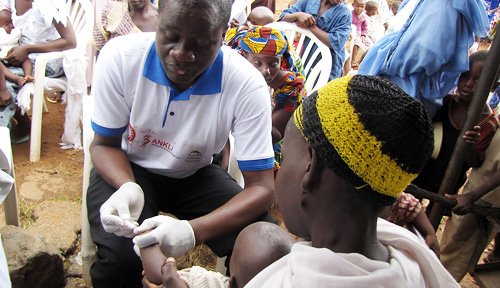When a child wakes with a raging fever, there’s a certain panic that charges through a parent’s heart.
Yet, that panic gives way to relief as parents in the United States rush their child to the nearest hospital for efficient, reliable and relatively affordable health care.
But should that child wake in a mud hut in Sub-Saharan Africa, the parent’s only resources might be a few herbs or antibiotics borrowed from a neighbor.
The reality of the situation is all too common in Nigeria, the homeland of pediatric infectious disease specialist, Stephen Obaro, M.D., Ph.D.
“Sixty-five percent of the children die,” he says softly.
“It doesn’t have to be that way.”
Every time he visits a developing country, he thinks about the skills he’s acquired in the United States and the resources that go to waste here. “I compare that to the lack of basic necessities needed to support the life of a critically ill child in poor countries. The inequity frustrates me.”
Now, he plans to change that.
In November 2011, Dr. Obaro received a $5 million grant from the Bill and Melinda Gates Foundation to provide the infrastructure and training, as well as the necessary data, to improve the clinical outcomes of critically ill children in Nigeria.
Through the grant, Dr. Obaro will establish better diagnostic services, provide microscopes and other equipment for basic lab work, and then train medical professionals at two teaching hospitals in north central and southwestern Nigeria on how to use the equipment.
The aim of the project is to identify the common causes of serious infections in children and to understand how underlying conditions, such as sickle cell disease, malnutrition and human immune deficiency virus (HIV) infection predispose children to life-threatening bacterial infections.
Recent studies from sub-Saharan Africa show that invasive bacterial disease, such as pneumonia, meningitis and sepsis — not malaria — is the leading cause of childhood mortality, Dr. Obaro said.
Too often, the lack of diagnostic equipment and trained professionals to pinpoint the cause of illness leads children with a fever to be misdiagnosed and treated with antimalarials or antibiotics.
What’s worse is that most government hospitals lack the necessary diagnostic facilities and equipment and must send samples to an independent lab where technicians may not be well trained.
“The amount of money the family has to pay for these services is weighed carefully by the doctor treating the child,” Dr. Obaro said. “Do they have enough to pay for both laboratory services and medication?”
In the U.S., it’s unthinkable to treat an illness without knowing the cause, but that’s the reality in Nigeria, Dr. Obaro said.
And while there are vaccines to prevent illness such as pneumonia and meningitis, they are not always the right ones, he said.
Pneumonia is caused by several types of viruses and bacteria. A particular type of bacteria, pneumococcus, is thought to be the leading cause of bacterial pneumonia in children worldwide. However, there are more than 90 different strains of these bacteria alone and understanding the prevalent strains in specific regions is key to formulating the appropriate type of pneumococcal vaccine.
“The best vaccine we have only contains 13 bacteria and it’s based on patterns of infection in the U.S., which doesn’t necessarily work in Nigeria or other countries,” Dr. Obaro said.
With proper diagnostic tools and training, researchers and health professionals can begin to understand what bacteria and viruses cause infectious diseases in Nigerian children and determine what vaccines are effective or look for new ones, he said.
“If we can harness our resources globally then we can truly make a difference and save lives.”
